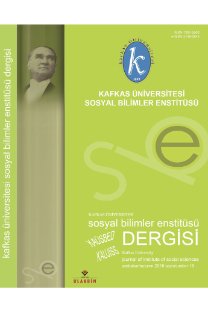Desperate man versus desperate woman: The ideal victim In Emily Brontë’s wuthering height
Gubar ve Gilbert’in Infection in the Sentence ve Bloom’un Influence of Anxiety adlı çalışmalarında ortaya koydukları fikirler göz önüne alındığında, Emily Brontë’nin Wuthering Heights adlı yapıtında resmettiği karakterler aracılığıyla bu fikirlerin tersi bir görüş ortaya konabilir. Başkişi Heathcliff’i değerlendirip onu "Brontë’nin elinde bir deli" olarak dikkate alırsak, erkek yazarlar tarafından işlenen sözüm ona Viktorya döneminin tüm kötü nitelikleri erkek takma adlı kadın yazar Emily Brontë tarafından erkeklere atfedilip, Viktorya döneminin ataerkil düzeninin ve erkek-merkezli dünyasının kadın odaklı bir atmosfere dönüştürüldüğü görülür. Romanda, Emily Bronte, önyargılı bir şekilde, başkişi Heathcliff’in Wuthering Heights’ın en üst tepesinden uçurumdan aşağı sürüklenişini gösterir. Brontë’nin bu romanında, ideal kurban kadın değil erkektir. Ayrıca Gubar ve Gilbert’in çalışmasındaki protestonun aksine, bu romanda, psikolojik olarak kötü şekilde resmedilen erkektir. Emily Bronte, bir bakıma, romanın erkek karakterlerine işkence ederek, Viktorya döneminde yazamayan kadın yazarların intikamını alır. Bu çalışma Gubar ve Gilbert’in Infection in the Sentence ve Bloom’un Influence of Anxiety adlı çalışmalarına bir karşıt görüş niteliğinde ideal bir erkek kurbanın (Heathcliff) ümitsizliğini ve mağduriyetini ortaya koymayı hedefler.
Umutsuz erkek umutsuz kadına karşı: Emily Brontë’nin wuthering heights yapıtında ideal mağdur
Considering what Gubar and Gilbert put forward in their article Infection in the Sentence and Bloom’s Influence of Anxiety, an opposite point of view can be realized through Emily Brontë’s characters in Wuthering Heights. Taking her protagonist Heathcliff into consideration and considering him as a ‘madman in the hands of Brontë’, it is observed that the patriarchal orders and male-oriented World of Victorian era is transformed into female-oriented atmosphere in which all the bad qualities of so called Victorian women which are forwarded by male authors are attributed to men by a male pen-named woman writer Emily Brontë. In the novel, Emily Brontë, in a biased way, depicts how the protagonist Heathcliff is dragged along the very top Head of the Wuthering Heights down the Cliff. In this novel, it is not woman that is ideal victim, but man. And in contrast to what Gubar and Gilbert protest in their study, it is men who are psychologically wicked. Emily Brontë, in a way, by torturing male characters in her novel, takes the revenge of woman writers who could not write during Victorian era. This study aims to reveal the desperateness and victimization of a male character (Heathcliff) through considering the opposite views of Gubar and Gilbert and observing Bloom’s Influence of Anxiety. Keyword
___
BLOOM, H. 2009. “Bloom’s Modern Critical Views: The Brontës”. Infobase Publishing. Print.BLOOM, H. 2007. “Bloom’s Modern Critical Interpretations: Wuthering Heights”. InfobasePublishing. Print.
BRONTE, E. 22.10.2012. “Poems by Currer, Ellis and Acton Bell”. i- bookversion.Web.
BRONTE, E. 22.10.2012. “WutheringHeights”.i-bookversion. Web.
BRONTE, CHARLOTTE. 22.10.2012. “Biographical Notes on the Pseudonymous Bells”.i-book version. Web.
CHESTERTON, G. K. 22.10.2012. “The Victorian Age in Literature”. i- bookversion. Web.
FATTAH, EZZAT A. 1986. “From Crime Policy to Victim Policy”. Macmillan. Print.
GALLAGHER, C. 2006. “The Body Economic Life, Death, and Sensation in Political Economy and the Victorian Novel”. Princeton University Press. Print
GHENT, D. V. 2007. “On Wuthering Heights in Bloom’s Modern Critical Interpretations: Wuthering Heights”. Infobase Publishing. Print.
GILBERT,SANDRA M. AND SUSAN G. 1979. “The Madwoman in theAttic: The Woman Writer and theNineteenth-Century Literary Imagination”. London: Yale University. Print.
GILBERT,SANDRA M. AND SUSAN G. 2007. “Looking Oppositely: Emily Brontë’sBible of Hell in Bloom’s Modern Critical Interpretations: Wuthering Heights”. Infobase Publishing. Print.
HUANG, PİN-C. 22.11.2012. “Of Humans and Monsters”. Web.
(ED) TODD, MABEL L. 22.10.2012. “Poems by Emily Dickinson”. i-book version. Web.
“Online Etymology Dictionary”.Web. 22.10.2012
“Oxford English Dictionary”. Web. 22.10.2012
- ISSN: 1307-5500
- Yayın Aralığı: Yılda 2 Sayı
- Başlangıç: 2008
- Yayıncı: Kafkas üniversitesi Sosyal Bilimler Entitüsü
Sayıdaki Diğer Makaleler
Ağrı’da (Karaköse) Demokrat Parti teşkilatlanması
Sofyalı Bâlî Efendi’nin Tasavvuf Anlayışı
Sebahattin YILDIZ, YENER PAZARCIK, ERKAN TAŞKIRAN, AHMET DENİZ, Nilgün BAYEZİT
Envâru’l-Âşikîn’de geçen bazı fiten hadislerinin bireysel ve toplumsal hayata etkileri üzerine
Desperate man versus desperate woman: The ideal victim In Emily Brontë’s wuthering height
